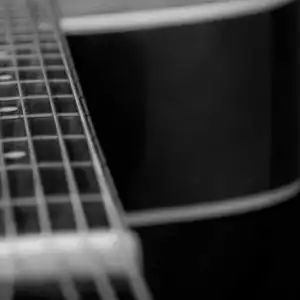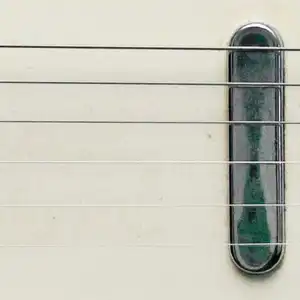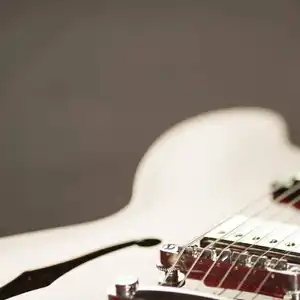Best Guitar Strings for Metal


Metal guitarists are unique in the guitar community. They have their own techniques, guitar, amps, and more just suited for metal. While most rock and blues guitarists can get by with standard gear, metal guitarists need gear that is capable of producing the aggressive sounds they desire. High-gain amplifiers, high output pickups, and extended range guitars have all become common in the average metal guitarist’s arsenal.
But one piece of gear that can get overlooked is strings. Strings can have a huge impact on your sound, which makes them an important part of your setup—and metal is no exception. Having the right strings can be the difference between a brutal breakdown and a breakdown that just doesn’t hit hard enough.
In this post, we will be covering the best guitar strings for metal and a variety of its subgenres, as well as why metal requires different strings to begin with. So crank up the Meshuggah and get ready for a deep dive into the best strings for metal.

Why You Need Different Strings for Metal
It’s no shock that metal music is very different from most other forms of guitar-based music. Metal is aggressive, heavily distorted, and often downtuned. Because of this, metal guitarists require strings that are uniquely prepared to handle their music. Let’s have a closer look at a few of those reasons.
Extended Range Guitars
The most obvious reason that metal players need different strings for metal is extended range guitars. A regular six-string set won’t cut it for a 7, 8, or even 9 string guitar. Those low strings require a much larger string gauge than comes with standard sets of strings. Without thick enough strings, those lower notes simply won’t come out clear and strong enough. Also, those low strings would be way too floppy without a heavier gauge string.
Since extended range guitars have increased in popularity, more and more string manufacturers are making customer sets for extended range guitars—Stringjoy included. We now offer multiple different sets of extended range strings specifically designed for 7 string, 8 string, and 9 string guitarists.
Downtuning
Another big reason why metal guitarists need different strings than regular rock guitarists is due to the prevalence of downtuning. Downtuned guitars require heavier strings to compensate for the lost tension. While a regular set of 10s or 11s may be fine for drop D, they simply won’t cut it for Drop C and beyond.
There are two main reasons why downtuning requires heavier strings—tension and sound. When you downtune, you are lowering the string’s tension. If you don’t compensate with heavier strings (or a longer scale length), the strings will be too loose and floppy. This makes it much more difficult to perform the fast and intricate playing that metal requires, particularly on the low strings.
The other reason is simply sound. Guitarists downtune because they want big, deep, heavy, low notes. When you downtune with lighter strings, you just don’t get that deep and powerful sound you want. Heavier strings however will make those downtuned riffs sound bigger, deeper, heavier, and more powerful. They can also help tighten up the lows as well, which also benefits metal guitarists.
Durability
The final reason metal guitarists require different strings than regular guitarists is durability. Metal is known for its heavy, aggressive, and hard-hitting playing, and the guitarists are no exception. They tend to hit their instruments a little harder than most other guitarists.
While that can yield great results musically, it can also result in more string breaking. To compensate, metal guitarists tend to use heavier strings that can withstand more abuse. No one wants to spend all their money replacing broken strings, so thicker strings are the obvious solution to the issue.

What are the Best Guitar Strings for Metal?
Now that it’s understood why metal warrants its own string recommendations, let’s move on to the strings that we feel are the best guitar strings for metal players. However, it is important to first note that these are only recommendations.
You can play metal on anything if you really want to (even a Telecaster). At the end of the day, it all comes down to your preferences, sonic vision, etc. If you want to play metal on a short scale, 6 string with 9s, you certainly can. There is no right or wrong when it comes to metal, and personally, I think metal could use some more variety gear-wise anyways. So maybe you should experiment, break some norms, and see what happens; that’s how metal came about in the first place anyways.
That said, we’d still like to give some recommendations that are well suited for different types of metal players. These suggestions are a great starting point for metal guitarists and can help you figure out exactly what you need. They also are great all around strings for these styles, and you likely won't be disappointed with these choices if you are looking for the best guitar strings for metal.
Best Strings for Drop Tuners
Our first recommendation is for all drop tuners out there—the 6 string guitarists going all the way down to drop C and beyond. While many metal guitarists have opted for extended range guitars, many still prefer to do it the old fashioned way and downtune their 6 string.
For those players, we recommend our Drop Tune Medium 11s. These strings were designed with drop tuning in mind, and they are best suited for drop C. That said, they can certainly work with lower tunings if you don’t mind the strings being a little slinky (or have a longer scale length guitar).
One of the biggest advantages of these strings is that they are designed to have balanced tension when drop tuned. Many metal guitarists have never played with balanced tension while drop tuned, and it can be a big surprise when you realize what you’ve been missing.
Best String for Shredders
Next up are the shredders—the players who are so fast and technical that they can make you want to quit guitar altogether. Shred players are a little bit unique in the metal world since their playing is more focused on leads than riffs. They need their guitars to be easier to play to be able to play as fast and complex as they do. However, they also still need strings that can withstand the aggression of metal.
That’s why we recommend our Husky Super Light 9s for shredders. These strings strike a perfect balance between ease of play and durability. They feature slightly beefed up wound strings, giving them a bit more tension and extending their lifespan. At the same time, the unwound strings are still light enough to allow for lightning fast tapping, sweep picking, and shredding.
Best Strings for 7 String Players
This next recommendation is for 7 string players. The biggest advantage of a 7 string is the versatility it brings. You have access to even lower notes while still having access to the same high notes. String wise, you want a set that can accentuate and accommodate that versatility; you don’t want super heavy strings that make bending and shredding near impossible, and you don’t want super light strings that make your 7th string slinky and loose.
Our 7 String Heavy Bottom Light 10s are a perfect choice for 7 string players looking to fully take advantage of their guitar’s versatility. These strings are essentially a beefed up set of light strings designed specifically for 7 string guitars, and they are a great fit for most 7 string players.
The biggest advantage of these strings, as expected, is versatility. They offer the tight and beefy lows you want out of your 7th string, but they don’t do so at the cost of high string ease of use. With these strings you’ll still be able to bend and shred on the high strings easily, all while being able to play crushing riffs on your lower strings.
Best Strings for 8 String Players
If you bought an 8 string guitar because you saw Tosin Abassi or Meshuggah using them, then this is the recommendation for you. 8 string guitars increase the versatility of the 7 string by adding yet another low string. While those outside of metal find 8 string guitars ridiculous, they have caught on in metal and are now just as common as 7 strings. 8 string guitars provide even lower notes while retaining the versatility of a 7 string.
We recommend our 8 String Heavy Bottom Light 10s for 8 string players. Like our 7 string sets, these strings were specifically designed with 8 string players in mind. The low strings are beefed up to provide the tight and powerful lows you need, and the high strings are thin enough to allow for all sorts of bending and lead playing.
They are also remarkably well balanced, something that is a bit uncommon with 8 string sets. Players seem to love the feeling of balance they get from these strings. We also offer an ironclad guarantee on our strings; if your guitar doesn’t sound and play better than ever before, just return them for a replacement or refund. You have nothing to lose by giving these strings a shot.
Best Strings for Doom Players That Tune Way Down
Doom, stoner, sludge—whatever you prefer to call it, this recommendation is for the players who play low and slow. If you’re taking a 6 string and tuning down to drop C, B, A, or even beyond, you need a set of strings that can handle that. Too thin and the lows are too loose and floppy, but too thick and the higher strings become near unplayable.
Our Drop Tune Heavy Gauge 12s strike a perfect balance for drop tuning. This set features a thicker low string to compensate for whole-step or further down tuning. You will have a beefy and playable low string that gives you the lows you want, but the higher strings will still be playable. With these strings, you don’t have to sacrifice bends and leads for heavy riffs.

Conclusion
Metal music and metal guitarists are unique, and they require different musical tools to be able to get the job done. Whether that’s high gain amps, extended range guitars, or drop tuning, these tools and techniques help metal guitarists achieve the sound they are looking for. Guitar strings are one of those many tools necessary to create metal music.
While the best guitar strings for metal is ultimately subjective, we hope that our recommendations will satisfy most metal guitarists in their search for the best guitar strings for metal. If not, these recommendations can serve as a great starting point and guide.
And don’t forget that we offer entirely custom sets of strings too; so if you try one of these sets and aren’t quite satisfied, we are more than happy to help you create a custom set that suits your needs perfectly.
Other Posts you may like

Guitar Strings Order: How the Guitar is Tuned and Why

Two Handed Tapping: Our Top 8 Tappers of All Time

Which Guitar Strings Wear Your Fret Wire Down More?

What is Nashville Tuning? Its History, Best Guitar Strings & Uses

Guitar Scale Length Explained: String Tension & Playability

What Guitar Strings I Used To Play...
0 Responses
Leave a Reply
Your email address will not be published. Required fields are marked *

